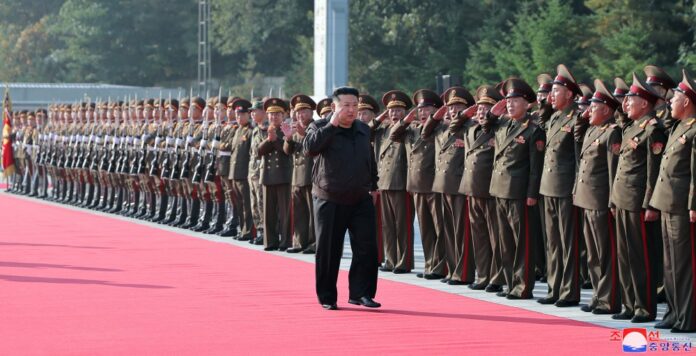Over 1,000 North Korean soldiers have been either killed or wounded in the ongoing war in Ukraine, South Korea’s Joint Chiefs of Staff (JCS) revealed this week.
The South Korean government has been monitoring the situation closely and gathered intelligence from various sources, including spy agencies. According to a statement from the JCS, more than 1,100 casualties have occurred among the North Korean soldiers who were sent to reinforce Russian troops fighting against Ukraine.
This information was made public following a report shared last week with South Korea’s parliament. The report detailed how at least 100 North Korean soldiers had been killed since they entered combat in Ukraine last December.
Pyongyang, the capital of North Korea, has reportedly sent thousands of its soldiers to assist Russian forces, including soldiers stationed in the Kursk border region. Ukrainian forces had seized this region earlier this year, increasing the urgency of Russia’s military efforts in the area.
The South Korean JCS assessment comes as part of ongoing intelligence gathering, which confirms that approximately 12,000 North Korean soldiers are currently in Russia, stationed along the front lines of the war.
South Korea’s sources also suggest that Pyongyang is preparing for the “rotation or additional deployment” of these soldiers in the coming months. This indicates that the number of North Korean troops fighting for Russia could rise even further.
The role of North Korea in this conflict extends beyond just sending soldiers. According to South Korean intelligence, North Korea has been producing and supplying self-destructible drones to Russia. These drones are believed to be a key addition to Russia’s arsenal as they fight against Ukrainian forces.
In addition, North Korea has been accused of providing Russia with missiles and artillery shells. This support has been part of a growing military relationship between the two countries, which has strengthened significantly since Russia’s invasion of Ukraine in February 2022.
The alliance between North Korea and Russia became more formal with the signing of a landmark defence pact in June. This agreement, which took effect in December, has deepened the military cooperation between the two nations. Experts believe that North Korean leader Kim Jong Un sees this as an opportunity to acquire advanced military technology from Russia.
Kim Jong Un is also believed to be eager to gain battle experience for his own troops. As the war in Ukraine continues, he looks to Russia as a source of military expertise and technology that could strengthen North Korea’s own defences.
However, this growing alliance between Pyongyang and Moscow has drawn sharp criticism from the international community. On Thursday, North Korea issued a statement condemning what it described as “reckless provocation” by the United States and its allies. This criticism was in response to a joint statement made by Western countries, which condemned North Korea’s support for Russia’s war in Ukraine, including the deployment of North Korean soldiers to the conflict.
In addition to the concerns raised about the deployment of North Korean troops, South Korea and Ukraine have been discussing their own security concerns. Last month, both nations agreed to deepen their security cooperation in response to the increasing threat posed by North Korea’s involvement in the war. While these talks focused on joint efforts to counter the military threat, they did not mention the possibility of South Korea providing arms to Ukraine.
South Korean President Yoon Suk-yeol made headlines earlier in November when he suggested that South Korea might not rule out the possibility of providing weapons to Ukraine. This would represent a significant shift in South Korea’s longstanding policy of not selling weapons to countries actively engaged in armed conflict.
The potential shift in policy could have a major impact on the ongoing war, as it would signal a further alignment between South Korea and Ukraine, particularly in their efforts to push back against Russian aggression.
As the war continues to unfold, the involvement of countries like North Korea and South Korea is growing more complex. North Korea’s support for Russia is seen by many as a strategic move to strengthen its relationship with Moscow, while South Korea’s growing partnership with Ukraine reflects a shift in its foreign policy priorities.
The death toll among North Korean soldiers highlights the human cost of this growing conflict. The war in Ukraine, which started as a regional dispute, has now become a broader geopolitical struggle involving countries with far-reaching consequences for global stability.

